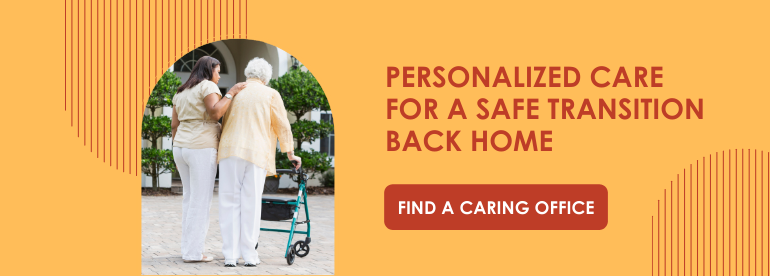Did you know that as many as 1 in 3 seniors are readmitted to the hospital within 30 days of being discharged? Despite the best care from hospital staff, a hospital stay can take a physical and mental toll on a senior. And having hospital admissions so close together can be devastating.
But many of these readmissions could be prevented with the help of home care. Here’s how.
1. Caregivers monitor changes in wellbeing.
READMISSION RISK
When a senior leaves the hospital, their doctor may provide them with a list of red flags to look for post discharge — changes in appetite, swelling, rash, pain, etc. These signs could indicate a health emergency and require a senior to return back to the hospital.
But sometimes, it can be hard for a senior to identify these symptoms. For example, if a senior has swelling in their ankles, they might not even notice. Seniors may also not want to admit how they are really feeling due to the fear of returning to the hospital.
HOME CARE SOLUTION
Professional caregivers can monitor a senior’s wellbeing and watch for subtle changes. For example, they can perform skin checks as they help a senior shower. Caregivers can help monitor appetite as they help prepare meals throughout the day. They can watch for signs of infection, fatigue, or swelling.
As they notice red flags, caregivers can promptly report symptoms to doctors or family members or even call 9-1-1 as needed. This monitoring can give family members needed peace of mind and help seniors get the medical attention they need to prevent further complications and hospital stays.
RELATED CONTENT: Top 5 Reasons for Hospital Readmission
2. Caregivers help seniors follow discharge instructions.
READMISSION RISK
Discharge instructions can be overwhelming for any patient at any age. It can be difficult to remember everything that a doctor tells you. And some instructions may be difficult for a senior to execute on their own.
However, following discharge instructions is key for seniors to maintain their health and avoid another stay in the hospital to address the same condition.
HOME CARE SOLUTION
Caregivers can remind seniors to follow their care plan and can assist seniors as needed. For example, a caregiver can help prepare foods that follow a specific diet. Or, they can help make sure a senior doesn’t do something that they aren’t supposed to.
Caregivers can also keep detailed care notes so that family members and even other caregivers know that the plan is being followed. As seniors stick to their care plan, they can reduce their risk for hospital readmission.
3. Caregivers provide medication reminders.
READMISSION RISK
When medication is taken incorrectly, it can have adverse effects and potentially be life-threatening to a senior. Seniors already take a number of prescription medications, and adding more can be difficult to keep track of. And, when paired together, some medications could have nasty side effects that could make a senior sick or put them at risk for falling and getting injured.
HOME CARE SOLUTION
Professional caregivers can review a senior’s medication list and provide medication reminders at the appropriate times. While caregivers do not administer medications, these reminders can help seniors stay on top of their medications.
Additionally, caregivers can help dispose of any expired medications, which can also pose dangers to seniors. If there are any adverse reactions to a medication, a caregiver is there to call for help.
RELATED CONTENT: Planning for a Successful Hospital Discharge
4. Caregivers prepare meals.
READMISSION RISK
It takes a lot of energy for the body to recover, making nutritious foods important. Seniors might have special dietary restrictions to help manage their condition. After being released through the discharge process, they might not have a stocked fridge and pantry to meet these dietary guidelines. Additionally, seniors might also feel too weak or ill to cook for themselves.
If seniors don’t eat properly, they may not have the strength to maintain their health at home and could end up in the hospital again.
HOME CARE SOLUTION
Caregivers can help seniors who have been discharged from the hospital by taking care of meals. They can start by clearing the fridge and pantry of any items that may have expired during the senior’s hospital stay.
Then, caregivers can take care of meals — from meal planning and grocery shopping to meal prepping and cooking. And they can find recipes that meet a senior’s nutritional guidelines. Caregivers can also take care of the dishes so that a senior can focus on rest and recovery.
5. Caregivers can help with a smooth transition home.
READMISSION RISK
When a senior is rushed to the hospital, one of the last things they will be thinking about is the pile of half-folded laundry on their bed. When a senior returns from the hospital, their home will be in the same state as when they left it. And that isn’t always safe.
Items on the floor can be a tripping hazard. Expired foods can be dangerous. General disarray can keep a senior from proper rest at home as they try to tackle cleaning before they are ready.
HOME CARE SOLUTION
Caregivers can prepare the home for a senior’s arrival by cleaning, stocking the fridge, and addressing fall hazards. They can change the sheets and make sure that a senior has clean clothes to wear. They can remove spoiled items from the fridge and take the trash out.
These tasks can make returning home a smooth transition and allow a senior to focus on recovery. Caregivers can also provide transportation when a senior is discharged.
RELATED CONTENT: Hospital to Home Step-By-Step Guide
6. Caregivers can attend follow-up appointments.
READMISSION RISK
Following a hospital stay, seniors may have a number of different doctor’s appointments. However, seniors might not be able to drive to their appointments or keep track of their schedule on their own. Some seniors might consciously choose to skip an appointment because they think they are healthy enough. However, missing these appointments and check-ins with doctors could be a health risk.
HOME CARE SOLUTION
Caregivers can help seniors understand the importance of attending follow-up visits. They can provide transportation to and from doctor’s appointments, so seniors get to each visit safely and on time. Caregivers can also attend the appointment with a senior so they are not alone. This companionship can help seniors feel more comfortable.
Plus, caregivers can help seniors understand what the doctor is saying. They can also record notes from the visit to share with family members involved in care.
At Caring Senior Service, we provide quality home care services to seniors to help them achieve the desired outcome: health and happiness. Our caregivers are trained to assist seniors with a wide range of health conditions — from Alzheimer’s to heart disease. Our trusted professionals can help healthcare teams reduce readmission rates by caring for seniors who have recently been discharged from the hospital. Reach out to a Caring team near you to learn more.


